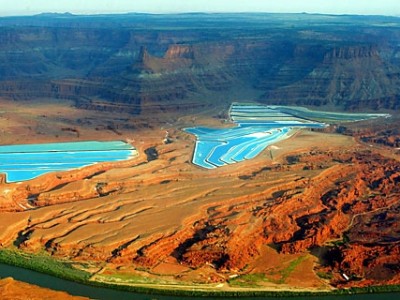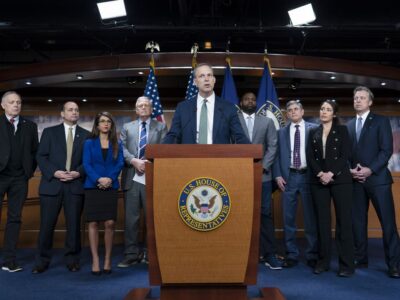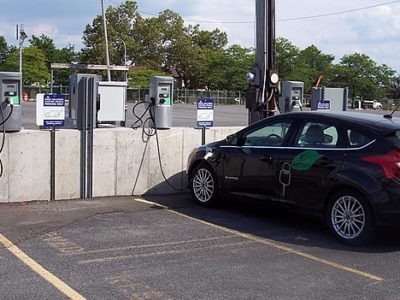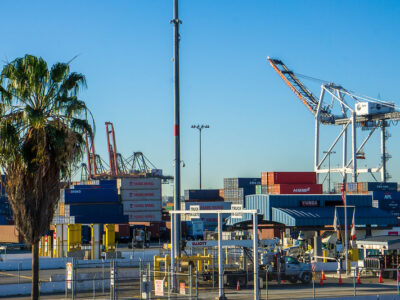Climate Change
Addressing Corruption In Electric Vehicle Battery Supply Chains
New CLEE/NRGI issue brief offers solutions
In the race to scale up a global supply chain for electric vehicle batteries, mining justice advocates have sought to ensure that the ongoing clean technology minerals boom does not exacerbate longstanding negative impacts from the global mining industry. Chief among these are corruption risks. To provide guidance to electric vehicle purchasers (particularly fleets), advocates, …
Continue reading “Addressing Corruption In Electric Vehicle Battery Supply Chains”
CONTINUE READINGThe New Frontier of Methane Regulation
Nations, companies, and NGOs are targeting methane like never before using satellite data. A new UCLA paper outlines what that could mean for regulation.
Methane is ready for its close-up. The first week of COP28, the UN climate talks taking place in Dubai, saw a handful of big announcements about how world leaders plan to tackle human-made climate change by targeting methane, a powerful short-term climate pollutant. The UCLA Emmett Institute is also drawing attention to the issue of …
Continue reading “The New Frontier of Methane Regulation ”
CONTINUE READINGClimate Change and the Hard-Headed Realist
Henry Kissinger showed that you don’t have to have a shred of idealism to favor climate action.
It’s not surprising that Bernie Sanders said, rather emphatically, that he was not a friend of Kissinger’s. Yet there was one issue where they did agree: climate change. If there was one thing that Henry Kissinger stood for, it was the hard-headed “realist” view of foreign policy — a view that prioritizes national interest at …
Continue reading “Climate Change and the Hard-Headed Realist”
CONTINUE READINGWhy Do Small Changes in Global Temperature Matter So Much?
One problem is that we’ve pursued optimization rather than robustness.
Scientists are warning us that even comparatively small changes in average temperature may have disastrous results. If you turn up your thermostat 2 ºC (about 3.6 ºF), the difference may be noticeable but it’s no big deal. So why is that a scary increase in global temperatures? Some reasons are physical, particularly the difference between …
Continue reading “Why Do Small Changes in Global Temperature Matter So Much?”
CONTINUE READINGClimate Backlash
Vicious attacks on climate progress are on the rise.
Presumably, no one actually wants rising seas, dangerous heat waves, severe droughts, runaway wildfires, and floods. Nor, I assume, are there many who want those climate disasters for their children and grandchildren. Still, there are all too many politicians and public figures who act as if their goal was to foment climate change. No doubt the …
Continue reading “Climate Backlash”
CONTINUE READINGU.S.-China Climate Deal Means Good Vibes for COP28
Here are key takeaways from the Sunnylands Statement on Enhancing Cooperation to Address the Climate Crisis ahead of the UN climate talks in Dubai.
The chances for a productive COP28—the U.N. climate talks that get underway Nov. 30 in Dubai—got a big boost from the recent climate agreement between the U.S. and China, the world’s two biggest polluters. Announced just before President Joe Biden and China leader Xi Jinping met at the APEC Summit in San Francisco, the …
Continue reading “U.S.-China Climate Deal Means Good Vibes for COP28”
CONTINUE READINGFour EV Trends
One of these things is not like the others.
The automotive world is changing quickly. Most of the trends are mutually reinforcing. But one points in the opposite direction. The first and most obvious trend is the rise of EVs. In the twenty years since Tesla arrived, EVs have gone from 0.2% of new cars to 13%, and Bloomberg predicts that this figure will …
Continue reading “Four EV Trends”
CONTINUE READINGHave We Begun the Third Age of Climate Law?
Some thoughts for Environmental History Week.
An international agreement in 1992 committed the world’s nations to addressing climate change but contained few specifics. The US ratified that agreement, but there was little concrete action here through the end of the 20th Century. As this century began, things looked optimistic, with both presidential candidates favoring reductions in carbon emissions. Promptly after taking …
Continue reading “Have We Begun the Third Age of Climate Law?”
CONTINUE READINGHow to Get to Zero Emissions at the Ports
A new report by UCLA and UC Berkeley examines policy solutions to accelerate deployment of zero-emission cargo handling equipment at the Ports of Long Beach and Los Angeles.
The Ports of Los Angeles and Long Beach are well on their way toward electrification, but the road to zero emissions is a long one. This new report—A Heavy Lift: Policy Solutions to Accelerate Deployment of Zero-Emission Cargo Handling Equipment at the Ports of Long Beach and Los Angeles and Beyond—surveys the biggest obstacles to …
Continue reading “How to Get to Zero Emissions at the Ports”
CONTINUE READINGGetting to Implementation
The Status of Local Climate Action in California
This post is co-authored by CLEE Climate Policy Fellow, Hanna Payne In the arc of climate action, we are firmly in the era of implementation. As climate change accelerates, communities across the state are experiencing the effects of a changing climate. To avoid the worst of these impacts, it is critical that we rapidly implement …
Continue reading “Getting to Implementation”
CONTINUE READING












